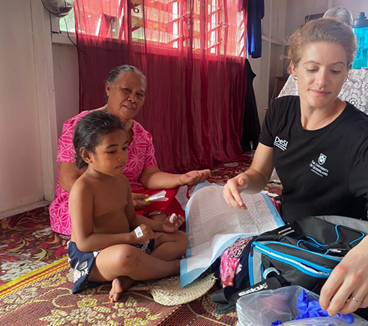
Lymphatic filariasis (LF), historically referred to as ‘elephantiasis’, has long posed a serious public health challenge across many Pacific Island nations.
However, after years of sustained effort, several countries have made remarkable progress, successfully reducing transmission to levels that the World Health Organization now deems low enough to declare LF is no longer a public health problem.
Yet, this is not the end of the road. LF has not been eliminated, and continued vigilance is crucial.
Ongoing surveillance is essential to identify and treat any remaining cases and ensure that new outbreaks do not emerge.
Under the leadership of Professor Colleen Lau, The University of Queensland Centre for Clinical Research’s (UQCCR) Operational Research and Decision Support for Infectious Diseases (ODeSI) Program , is playing a key role in ensuring the hard-won gains in LF elimination in the Pacific are preserved.
By working closely with national and regional health authorities, ODeSI is at the forefront of developing endgame LF surveillance strategies that produce actionable evidence to drive targeted responses.
A unique aspect of ODeSI’s approach is its emphasis on partnership and active engagement with its stakeholders.
This collaboration with end-users—those on the frontlines of public health service delivery—helps shape the program’s research activities, ensuring it addresses real challenges.
Dr Adam Craig and Dr Harriet Lawford lead one of the ODeSI Program’s stakeholder engagement initiatives.
Their efforts centre on an inclusive process of listening, learning and collaborating with local stakeholders from the Pacific Islands to identify and prioritise LF surveillance needs, and understand what role research can play in response.
“Our work has involved discussions with individuals and groups from across the Pacific Islands to understand the drivers and barriers for LF surveillance and how research can help,” Dr Craig explained.
Dr Lawford added, “This engagement is fundamental to shaping research that meets the needs of health workers and communities in the region.”
The ODeSI Program’s collaborative approach focuses on learning from, and tailoring research to, the unique challenges faced by its end-users.
This was exemplified at the UQ co-hosted Coalition for Operational Research on Neglected Tropical Diseases (COR-NTD) Meeting for the Pacific Islands, held in Brisbane.
Here, ODeSI Program staff worked closely with their Pacific counterparts to co-design future research aimed at addressing complex public health challenges.



